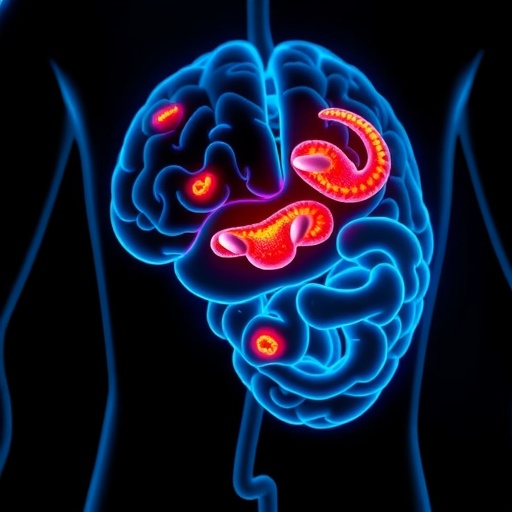New Insights into Gut-Brain Interactions Illuminate the Complex Biology of Eating Behaviors
Recent groundbreaking research has illuminated the intricate communications between the gut and brain, revealing how these interactions significantly influence human eating behaviors. Two comprehensive studies, published in Clinical Gastroenterology and Hepatology and Gastroenterology, delve into the complex neurobiological and socio-environmental factors that govern eating patterns, providing a fresh perspective on the multifaceted mechanisms underpinning digestive health and nutrition.
The gut-brain axis, a bidirectional communication system connecting the central nervous system with the gastrointestinal tract, has gained substantial attention in recent years. These new studies emphasize that this axis is modulated not only by biological factors but also by external life circumstances, such as stress, socioeconomic status, and access to healthcare. Such factors can profoundly impact eating behavior, metabolism, and ultimately, overall health. The integration of microbiome science with neurogastroenterology in these papers marks a significant advance in understanding how the gut-brain network orchestrates complex physiological and psychological responses related to food intake.
One of the key revelations from the first study is how social determinants of health — encompassing variables like income disparity, educational background, and healthcare availability — intersect with the brain-gut-microbiome axis to modulate obesity risk. Stress induced by adverse life conditions appears to disrupt the delicate microbiome balance, consequently affecting neural pathways involved in mood regulation, cognitive decision-making, and hunger signaling. This disruption can drive cravings for calorie-dense foods, fostering patterns that contribute to excessive weight gain. Unpacking these biological-social interactions offers a sophisticated framework to refine therapeutic approaches for obesity, moving beyond simplistic dietary advice toward more personalized and context-aware interventions.
Delving deeper into mechanistic pathways, the study highlights how chronic psychosocial stress modulates hypothalamic-pituitary-adrenal (HPA) axis activity, thereby influencing gastrointestinal function and microbial composition. Elevated cortisol levels, a hallmark of prolonged stress, have been implicated in altering gut permeability and immune responses, which can trigger low-grade inflammation and dysbiosis. These physiological alterations feedback to the brain via vagal afferents and systemic cytokines, perpetuating maladaptive eating impulses and undermining metabolic homeostasis. Such insights underscore the importance of addressing psychosocial elements alongside microbiotic and neurological considerations in managing obesity and related metabolic disorders.
The second paper explores a less-studied but equally critical facet of gut-brain dynamics: the relationship between disorders of gut-brain interaction (DGBI) and avoidant/restrictive food intake disorder (ARFID) symptoms in adults. This pioneering, population-wide investigation reveals a strikingly high prevalence of ARFID symptomatology among individuals with DGBI, suggesting a pervasive and under-recognized clinical overlap. Symptoms such as sensory-based food avoidance, diminished appetite, and anticipatory fear of negative gastrointestinal consequences were commonly reported, highlighting an intricate biopsychosocial interplay mediating eating disorders.
From a pathophysiological perspective, DGBIs—conditions typified by dysregulated gut motility, visceral hypersensitivity, and altered central processing of gastrointestinal signals—likely predispose individuals to restrictive eating behaviors due to persistent discomfort and anxiety. This nexus between physical gut disturbances and restrictive eating patterns warrants routine screening for ARFID symptoms within gastroenterological clinical settings. By integrating gastrointestinal, nutritional, and mental health care, clinicians can better address the heightened health burdens and compromised quality of life experienced by these patients across all body mass indices.
Importantly, these studies converge on the concept that gut-brain communication transcends simple digestive function and plays a pivotal role in the etiology of both overeating and restrictive eating disorders. The complex dialogue between enteric neurons, central brain structures, and the resident microbial community is sensitive to both intrinsic factors—such as genetics and immune activity—and extrinsic stressors including discrimination, trauma, and prior health status. Together, these determinants sculpt the neural circuits governing hunger, satiety, and food-related behaviors.
These discoveries carry profound implications for clinical practice, advocating for a paradigm shift toward multidisciplinary, patient-centered treatment models. Standard approaches focusing solely on caloric intake or gut symptom management may miss critical drivers of maladaptive eating behaviors rooted in neurobiological and psychosocial factors. Advanced diagnostic tools incorporating neuro-gastroenterological assessments and psychometric screening for eating disorders could enable tailored interventions. Furthermore, therapies targeting microbiome composition through diet, probiotics, or fecal microbiota transplantation may become central elements of comprehensive care.
Beyond individual treatment, public health strategies must recognize the influence of social determinants on gut-brain axis function to mitigate obesity and eating disorder prevalence at the population level. Addressing systemic inequities related to income, education, and healthcare access is essential to reduce chronic stress exposures that weaken gut-brain homeostasis. Community-based programs promoting resilience, mental well-being, and nutritional literacy can foster healthier gut-brain interactions and eating habits across diverse demographics.
In sum, this evolving body of research heralds a new frontier in understanding how gut microbes, neural networks, and life contexts collectively govern human nutrition and health. The recognition that “why” patients eat is as crucial as “what” they eat opens expansive avenues for scientific inquiry and clinical innovation. Future investigations will undoubtedly build on these foundational findings to unravel precise molecular mechanisms and develop targeted interventions to enhance digestive and mental health outcomes worldwide.
Subject of Research: Gut-brain interactions and their role in shaping eating behaviors, with a focus on the influence of social determinants and disorders of gut-brain interaction on obesity and avoidant/restrictive food intake disorder symptoms.
Article Title: New Papers Shed Light on Gut-Brain Interactions in Eating Behaviors
News Publication Date: September 2, 2025
Web References:
Image Credits: Gastroenterology & Clinical Gastroenterology and Hepatology
Keywords:
Gastroenterology, gut-brain axis, microbiome, obesity, eating behavior, avoidant/restrictive food intake disorder, disorders of gut-brain interaction, social determinants of health, neurogastroenterology, psychosocial stress, metabolic health, personalized nutrition




